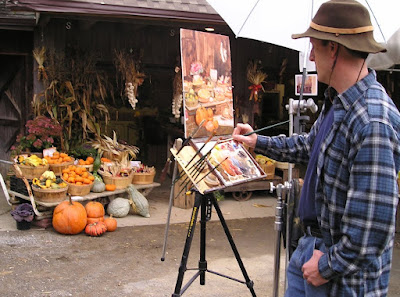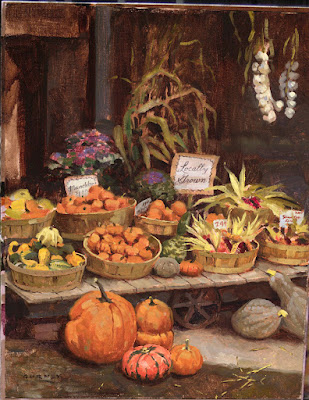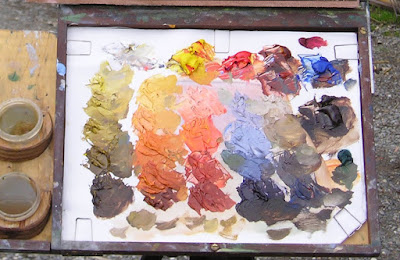On Instagram, I posted about this plein-air still life in oil, and some of you had questions:

fefecru: "Can I ask you what umbrella is that? Anyone in particular you’ll recommend?
A: It’s a Jullian umbrella, designed to clamp onto a French easel, but I keep it on a C-stand so that it doesn’t blow over and bring my painting into the wreckage."
A: That’s an Open Box M easel, which may not be made anymore, but there are others like it, and there's a Facebook group about building your own.
bencrastinate "Does painting with an easel help? Ive always painted my canvas flat on my desk. What are the benefits of painting on a vertical surface?"
A: I find it helps my speed and accuracy to have my painting set up perpendicular to my line of sight, and directly adjacent to, the same size as, and in the same light as my subject.
grinningink "Since you used oil here, wasn’t it still wet when you sold it that same day? Was there something to protect it when the customer took it?"
A: Yes, this was for a paint-out. I framed it and it was auctioned same day. I knew the owner, and after it was thoroughly dry I borrowed it back to varnish and photograph it.
A: A lot of oil painters have used premixed colors. I was thinking mainly of Frank Reilly, but using an adapted version of his practice.
janice_skivington "Please list the names of oil colors on the pallet, looks like three primaries and white."
It’s the 5-color palette recommended by John Stobart in his book The Pleasures of Painting Outdoors: titanium white, cad yellow light, pyrrole red, burnt sienna, and ultramarine blue. You can paint almost anything with those five colors.
tomkatermurr "Would you also premix your colors when you paint with other mediums?"
In theory you could premix with water media, but the pools of color would tend to dry too fast.
Related previous posts: Painting Pumpkins



تعليقات
إرسال تعليق